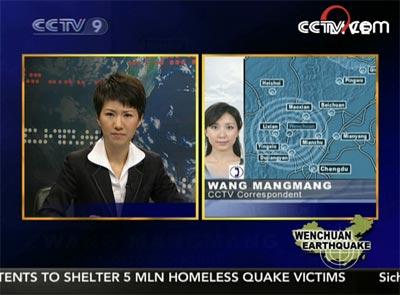Source: CCTV.com
05-22-2008 18:44
My eyes have been glued to TV screen for the past 4 days and they have been wet most of the time. Most people in China are with me being deeply concerned by the tragedy in Sichuan.
CCTV's news channel is doing a marvelous job in covering the breaking news. Thirty minutes after the quake, CCTV-News managers have made a very professional decision to cancel all the regular programming to make the channel 24-hours live from the studio. It has maintained an efficiant link between the stricken area and the rest of the world. I can imagine how intensively the CCTV people are working to keep the live coverage going.
 |
| CCTV's live coverage on Wenchuan quake |
In 2001 when the US invasion of Iraq took place, CCTV made its attempt in live broadcasting around the clock. However, it was not our war, the videos were invariably second-hand. But this time, CCTV news department jumped on the chance and gripped firmly to prove its power of the No.1 media.
Bai Yansong again stood the test to be China's top anchorman with his perfect wording and delivery. Hai Xia and Zhang Quanling impressed us with their dedication. Zhang Quanling's on-site stand-ups were adequately quick-paced and faultless. Of course, the supports from many many excellent reporters have contributed tremendously to the good-work of CCTV-News.
Reporting disaster for TV is a very challenging job. I have been to Hainan, Lijiang, Kashikar and Banda Ache for the same cause. So I understand that it's hard for the reporter in the field to file back a comprehensive report about disaster. The reporting is hampered by the poor transport condition, one can only get bits and pieces here and there. The reporter should be content with conveying his or her personal observations only. The editors at home must be responsible for putting together the whole story for news bulletin.
TV reporters always have to do more than the print journalists because they must get the footage of the progressing events, not to mention video editing, voice-dubbing and transmitting the finished story back to headquarters.
 |
| CCTV's live coverage on Wenchuan quake |
The most difficult thing is to work in great depression. The sight of the extensive ruins, the odor of decomposing bodies, the sound of desperate cries, the look of human dispair ... all loom heavily in the reporters' mind. The psychological pressure is so devastating that the body becomes weak and irresponsive. I remembered my working alone in Banda Ache. I was too exhausted to concentrate in the evening and I had to doze for half an hour before start writing script. Having not enough intake of food, espcially water, the reporter would be more in danger of a breakdown.
The danger the reporter encounters may incomparable to the danger of rescue work, but the stress of fulfilling the intellectual task before deadline is apparently toucher.
My salute to all who are working so hard to broadcast the on-going event as well as the rescuers digging out the victims.
 |
| CCTV's live coverage on Wenchuan quake |
Editor:Xiong Qu
